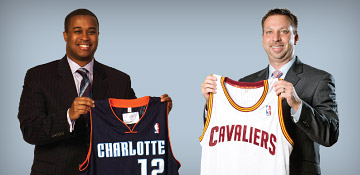Two Can Play at This Game
Category: WebExtras
We couldn’t quite fit everything from our interviews with Blackstone and Walters in the print magazine. Here’s a little more from and about these two all-stars:

Michael Blackstone; photography: Eric Mull
Blackstone on rebuilding the team post-LeBron James:
LeBron is a once-in-a-generation kind of player, so that would leave any team with a lot of work to do. The team was the best in the league for several seasons, and then to go to the bottom was a very painful thing for everybody. But he left, and we had to decide how to move on.
There are so many things we can’t control that we’re focusing on controlling the things we can. We’re tasked with rebuilding the team, but how do we go about that the right way? It’s very easy to build a mediocre team, but once you’re there, it’s incredibly difficult to get out—and the process is even more painful than anything we’re going through right now.
You acquire new players in the draft, in a trade or through free agency. The draft is extremely important but the most straightforward in terms of the process; rookie contracts are mostly about negotiating the little stuff. In a trade, you work it out with the other team, and getting two to tango is much easier said than done. Free agency is the most difficult player- acquisition vehicle to manage and can get a team into big trouble financially at times. You only have so much money you can spend overall. You try to balance out the players you are looking at—does each one make sense for us, both now and in X years?
A lot of the decision-making requires having a sound process, great communication and empowering leadership who will give you the resources and time you need. You only make so many transactions a year. That’s why each one is so important.
Walters on the bumpy road to becoming an attorney:

André Walters; photography: Kent Smith
For my whole life, my goal had been to get into law school. The thing is, once you get there, you have to figure out what you’re going to do with it. I didn’t even do that well my first year and I realized I had to get serious.
That first summer, I had an internship in the offices of J. Wyndal Gordon [J.D. ’95], a University of Baltimore grad whose firm handles a whole range of criminal defense, family law, medical malpractice and business litigation. I got to see how law was practiced.
I went back to Baltimore for my second year and achieved a 3.7 GPA that fall semester, and I continued to perform at a high level from then on. I also needed money at the time, though, so I worked full time at Kinko’s while I went to law school. Working at Kinko’s caused me to be tired all the time, but it was a great reminder that this was not what I wanted to do for the rest of my life. Ironically, despite [my] being constantly exhausted, the Kinko’s experience not only humbled me, but also ultimately invigorated me.
One day, I attended an event being held at school before I went to work, and a woman from Black Entertainment Television was on the panel. I asked her about a legal internship, and she gave me her card. I got hired and spent my second summer driving between Baltimore and Washington, D.C., every day, but it was a phenomenal experience.
By the time I went back for my third year, I thought entertainment law was what I wanted to do. During my third year, though, I interned with a local attorney who gave me an offer of employment. After graduation, I took the bar exam and called him. That was when he told me that he didn’t have the money to hire me. My wife was already working at a firm, but we needed two incomes to build a house. It was a rough start.
Rather than sulk, I decided to search hard for an associate attorney position. Luckily, I found a job within a few weeks as an associate attorney at Naka, Huttar & Oldhouser, a small transactional firm in Baltimore. I learned a lot about being a transactional lawyer [there], and I ultimately credit [the firm] for helping me build the foundation I would need to do what I do today. Everything happens for a reason; I’m truly blessed.





